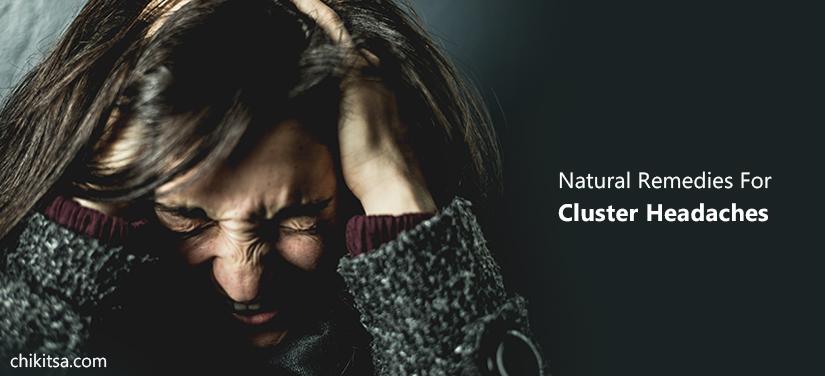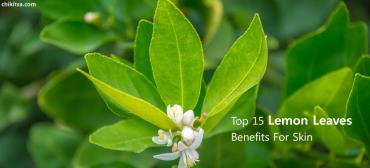5 Natural Remedies For Cluster Headaches

What Is A Cluster Headache?
The term "Cluster headache" refers to headaches that occur in cyclical patterns or clusters. Cluster headaches occur up to eight times every day during a cluster period. The cluster period can last a few days, weeks, or months, after which follows the remission period during which the headaches disappear completely for months or years; they can recur later with no warning.
A cluster headache typically awakens you from sleep with intense pain on one side of your head and in and around the eye, the pain is felt as sharp, burning, or a piercing sensation. The attacks mostly occur in the middle of the night and can be more severe than the attacks during the day.
Cluster headaches are rare, affecting 1 in every 1000 people. It usually occurs between 20 and 50 years of age; and is seen more in men and mostly smokers. Though rare, cluster headache in pregnancy is reported and seems to occur with the same characteristics and severity as in nonpregnant patients.
[Also Read: What to take for a headache while pregnant]
The cause for cluster headache remains unclear and there is no known cure. But there are effective natural remedies for cluster headaches, that provide pain relief, decrease the intensity and the frequency of attacks.
Symptoms Of Cluster Headache
A cluster headache starts suddenly, usually without warning. Symptoms during a headache include;
- Pain on one side of the head
- Severe pain, behind or around the eye; the pain may radiate to your face, head, and neck
- Restlessness
- Redness or watering of your eye on the affected side
- The runny or stuffy nose on the affected side
- Warm and red face
- Sweating on the face or forehead on the affected side
- Sensitivity to light
- A smaller pupil in the eye
- Swelling and drooping of the eyelid on the affected side
Characteristics Of Cluster Period
The cluster period that generally lasts for several weeks to months may be consistent from period to period. For example, cluster periods can occur every spring or every fall.
Cluster headaches are of two types;
- Episodic Cluster Headaches - Occur regularly for one week to one year, followed by a remission period that can last up to one year.
- Chronic Custer Headaches - Occur regularly for more than one year, followed by a remission period that lasts for less than a month.
During a cluster period;
- Headaches usually occur several times a day
- A single attack can last from 15 minutes to up to 3 hours
- The attacks occur at the same time each day
- Most often, attacks occur at night, mostly 1-2 hours after going to bed
Causes Of Cluster Headache
It is still not clear as to exactly how a cluster headache occurs. Scientists believe that activation of a specific nerve pathway from the hypothalamus, the area of the brain that controls body temperature, sleep, and the release of hormones, is responsible for causing cluster headaches. The signals released from the hypothalamus cause dilation (widening) of the blood vessels that supply blood to the brain and face, resulting in greater blood flow to the brain. This dilation applies pressure and affects the nerve called the trigeminal nerve that transmits sensations from the face to the brain. The activation of the trigeminal nerve is said to cause the cluster headache pain.
The cyclical pattern of cluster headaches is said to be linked to the biological clock, located in the hypothalamus.
Cluster headaches are also linked with the sudden release of chemicals - Histamine that fights allergens and serotonin that regulates mood. Other triggers include nitroglycerin, a medication used to treat heart disease.
Natural Remedies For Cluster Headaches
There are a few natural remedies for cluster headaches that are effective. These include;
1. Melatonin
Melatonin is a hormone made by the brain to regulate sleeping patterns. People getting cluster headaches are reported to have low melatonin levels. Taking melatonin supplements (10 and 25 milligrams) before going to bed is found to help prevent cluster headaches. However, for chronic cluster headaches, this treatment is less effective.
2. Capsaicin Cream
Topical capsaicin cream is found to help manage cluster headaches. The cream can be applied to the nasal mucosa (inside of your nose) using a cotton swab.
3. Deep Breathing Exercises
Doing deep breathing exercises are more beneficial. Oxygen therapy is the best and safest way to treat a cluster headache. Breathing extra oxygen into the bloodstream calms the body and helps to manage pain. Oxygen therapy in conjunction with medications is found to be more effective during an attack.
3. Magnesium
Studies have reported low levels of magnesium in patients with cluster headaches. Taking magnesium supplements or consuming foods containing magnesium is found to be beneficial.
4. Kudzu Extract
Extracts of the kudzu plant is reported to help with cluster headaches. Studies show this extract to decrease the intensity or the frequency of cluster headache attacks.
Tips To Prevent Cluster Headaches
The following may help prevent or reduce the risk of cluster headache attacks;
1. Avoid Alcohol
During the cluster period, abstaining from alcohol may help reduce the number of attacks
2. Avoid Certain Medications
Inhaled nitroglycerin causes dilation of blood vessels that is linked to cluster headache attacks.
3. Avoid Exercise In Hot Weather
Workout or exercise in hot weather can trigger cluster headaches
4. Maintain A Regular Body Temperature
In people susceptible to cluster headaches, a sudden rise in body temperature can trigger an attack
5. Quit Smoking
Many people suffering from cluster headaches are smokers. Giving up smoking may help by improving sleep patterns and nerve responses.
6. Maintain A Regular Sleep Routine
Cluster headaches are shown to be linked with changes in the sleep pattern, hence a regular sleep routine may lead to fewer cluster headaches.
When To See A Doctor
You must see a doctor;
- If you have just started having cluster headaches to rule out other diseases and to get the right treatment
- If the pattern of your cluster headache changes or you suddenly find it different
Natural remedies for cluster headaches are effective for managing the pain without requiring visiting a doctor. But if your symptoms still persist after following the natural remedies then it is the time you must visit the doctor and take the required treatment.









